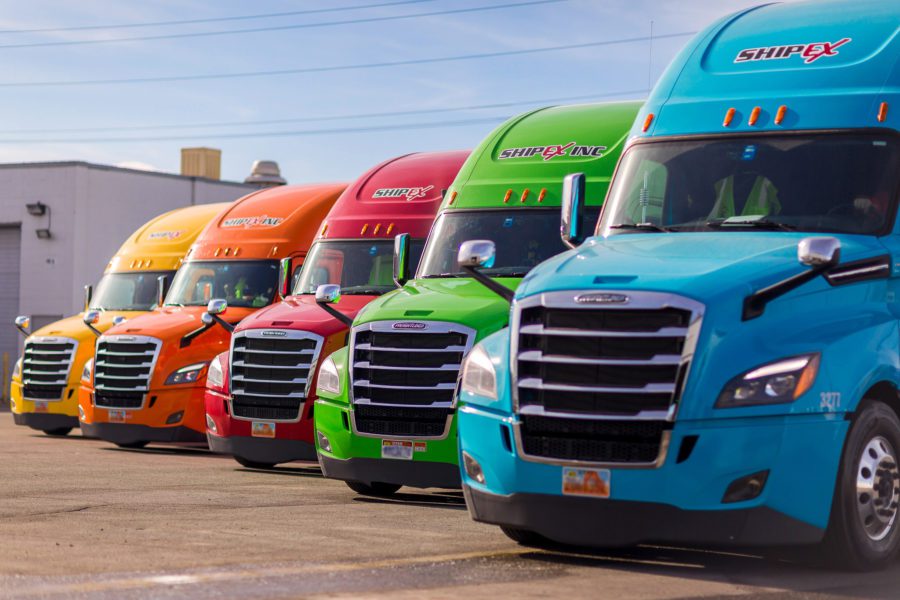Owner-operator jobs involve individuals who own and operate their trucks to haul freight for various clients. These individuals are responsible for not only driving the truck and delivering the freight but also for maintaining and repairing their equipment. As an owner-operator, you have the freedom to choose your loads and routes, but you also bear the responsibility of managing your own business and financial risks.
Owner-operators often operate under a contract with a transportation company, in which they agree to haul loads for the company in exchange for a fee. The pay is typically based on the number of actual miles they drive or the percent of the load cost they take. This means that their income can fluctuate from week to week, depending on the number and type of loads they can secure. This leaves you very susceptible to the risks of a changing freight supply.
While owner-operator jobs offer a great deal of independence and flexibility, they also come with their own set of challenges. In addition to managing their equipment and finances, owner-operators must also navigate the competitive world of transportation and work hard to secure good-paying loads. Below we will detail more of the risks and responsibilities that you would take on as an owner-operator truck driver.
A Closer Look at Owner-Operator Pay
What Is the Average Pay for Owner Operators?
The average take-home pay for an owner-operator varies widely, depending on several factors. According to TruckStop.com, the average annual salary for owner-operators is around $100,000 before expenses, but this number can be significantly lower depending on your experience, the type of truck you drive, and the region you operate in.
One important thing to note about owner-operator pay is that the advertised average pay does not always reflect the actual take-home pay that you can expect to receive. This is because many expenses must be taken into account when calculating your income, including fuel, maintenance, insurance, and more.
In addition to the base pay for each load, owner-operators may also be eligible for additional payments, such as fuel surcharges or bonuses for being a preferred driver. These additional payments can help to increase your overall income, but it’s important to carefully read the terms of any contract or job alert to understand exactly what you will be paid for each load. Our resource on owner-operator pay can help you better understand the income you can expect.
To become an owner-operator, you will need to have a commercial driver’s license (CDL) and your own truck. You may also need to pass a driver application form and background check before you can start working. It’s important to maintain a clean driving record and keep your equipment in good condition to be a preferred driver and secure high-paying loads.
The Dark Side of Owner Operator Jobs
 While owner-operator trucking jobs can offer freedom and flexibility, they also come with risks. One of the main risks is fluctuating pay, as it’s based on the number of miles driven or the percentage of the load cost taken. This can make it difficult to budget and plan for the future.
While owner-operator trucking jobs can offer freedom and flexibility, they also come with risks. One of the main risks is fluctuating pay, as it’s based on the number of miles driven or the percentage of the load cost taken. This can make it difficult to budget and plan for the future.
Another risk is high expenses, as you are responsible for the purchase, maintenance, and repair of your truck and equipment, as well as fuel and insurance costs. The fuel surcharge trucking companies would be responsible for is now your responsibility. All of the heavy lifting that is done by others in a company would fall to you.
There are also physical risks, as you will spend long hours on the road and may face hazardous conditions. To mitigate these risks, you can work with a reputable trucking company or broker, which can offer good pay, consistent work, and a supportive environment. However, this may remove some of the freedom of running your truck.
After expenses, owner-operator truck drivers may see an average pay of around $40,000 to $60,000 per year, but this can vary based on the number of loads secured and the pay per load. Salary pay for truck drivers who work in trucking companies offers benefits such as a consistent paycheck, easier qualification for loans, and access to additional benefits like health insurance and paid time off.
Cons of Being an Owner-Operator
 While being an owner-operator truck driver can be a rewarding and fulfilling career, it’s important to understand the cons and risks involved. In this section, we will delve into some of the challenges and potential drawbacks of being an owner-operator and discuss why it may not be the right fit for everyone.
While being an owner-operator truck driver can be a rewarding and fulfilling career, it’s important to understand the cons and risks involved. In this section, we will delve into some of the challenges and potential drawbacks of being an owner-operator and discuss why it may not be the right fit for everyone.
Pay DependEnt on Loads
 As an owner-operator truck driver, you always need to be on the lookout for the latest job alert that will cover your expenses and allow you to make a profit. This can be a time-consuming and stressful process, as you may need to use a logistics phone app or call around to different freight brokers and trucking companies to find available loads.
As an owner-operator truck driver, you always need to be on the lookout for the latest job alert that will cover your expenses and allow you to make a profit. This can be a time-consuming and stressful process, as you may need to use a logistics phone app or call around to different freight brokers and trucking companies to find available loads.
If you are unable to find a load that pays what you need, you may be forced to either not work and not make any money or take a lower-paying load that may not cover your expenses. This can make it difficult to budget and plan for the future, as you never know exactly how much you will be earning.
In addition, the pay per load can vary greatly and you may not be given the same number of miles for each load, making it difficult to rely on consistent pay. These risks of having your pay dependent on loads can be challenging for owner-operator truck drivers. Without the support of being a company truck driver, you have to pay for these risks on your own.
If your truck has physical damage, you will not be able to earn any money while it is being repaired. Any service needed is going to be taken directly from your bottom line without anyone else paying that cost for you. With the fast-paced nature of the transportation industry, this can be very damaging to a business.
Overworked Drivers
 As an owner-operator, the pressure to make money can be intense. These drivers are responsible for all the heavy lifting when it comes to securing loads, managing finances, and maintaining their equipment. With the rise of gig economy jobs, many owner-operators feel the need to constantly be on the lookout for new job alerts and opportunities to make ends meet.
As an owner-operator, the pressure to make money can be intense. These drivers are responsible for all the heavy lifting when it comes to securing loads, managing finances, and maintaining their equipment. With the rise of gig economy jobs, many owner-operators feel the need to constantly be on the lookout for new job alerts and opportunities to make ends meet.
This constant search for freight can lead to long hours on the road and a lack of time for rest and relaxation. Many owner-operators report feeling overworked and burnt out due to the demands of the job. They may find themselves driving longer and longer distances just to make enough money to pay their bills and support their families.
Another risk that you can take on is loading the truck yourself. When you work for a trucking company, they can ensure that you have no touch routes so you never have to worry about that. Without that support, you could be held responsible for the load.
The physical and mental toll of this constant pressure can be significant. Owner-operators need to find a balance between making a good living and taking care of their well-being. This may mean finding a reputable trucking company or broker to work with or setting limits on the number of miles they are willing to drive each week. By taking care of themselves, owner-operators can ensure they have the energy and stamina to handle the demands of the job.
Less Home Time
 A common misconception about independent owner-operators is that you will have daily home time and only work normal full-time hours. In reality, it means that you have less home time because you do not have the option to be paid during that time.
A common misconception about independent owner-operators is that you will have daily home time and only work normal full-time hours. In reality, it means that you have less home time because you do not have the option to be paid during that time.
If you aren’t driving your truck, you aren’t making any money, so you may feel pressure to be on the road as much as possible to maximize your earnings. This can lead to long periods away from home, as you work to secure as many loads as possible to increase your gross revenue.
In addition, as an owner-operator, you are responsible for finding your own no-touch loads and securing your own contracts. This means that you may need to spend a significant amount of time researching and applying for available job alerts, negotiating rates, and managing your logistics. All of this extra work can take away from the time you have to spend at home with your loved ones.
High Expenses
One of the major cons of being an owner-operator truck driver is the high expenses that come with the job. Owning and operating a truck is not a cheap endeavor, and there are many ongoing expenses that you need to consider. For example, you will need to pay for fuel, maintenance, insurance, and other transportation costs.
In addition, you may need to pay for things like lodging, meals, and other incidentals while you are on the road. All of these expenses can add up quickly, and it’s essential to carefully manage your finances to stay afloat. All of these expenses are not including the taxes that you would have to pay. These are often 20%-30% of your net income.
The high expenses of being an owner-operator can be especially challenging for drivers who are working on a cents-per-mile basis, as they may not always have a guaranteed income and may need to be strategic about which loads they choose to maximize their profits.
Conclusion
Many different factors can influence life on the road, especially for owner-operators. Being prepared is the best way to ensure that you are making the most of your time and maximizing your income. For those who do not want the added stress of owning their own company, being a company driver might be a better fit. At ShipEX our drivers earn a stable salary plus monthly opportunities for bonuses! This consistency plus reduced stress makes us a great fit for good drivers who want to work in transportation without the headache.

